Finance Minister Edward Scicluna hinted at the regulation of rental markets, not through control, but through the monitoring of contracts and dealings between tenants and landlords in order to ensure that the rights of both are being honoured.
"When we speak about regulation we are not talking about control. We are talking about regular monitoring of contracts between landlords and tenants. The fact that you have tenants who do not have access to their utility bills does not happen outside of Malta. Landlords not declaring their rental income is also something that needs to be further looked into"
He said that there were only a few instances where, after the government announced that it had doubled the rent subsidy, a few could not take up this offer as they were not in a position to reveal that they are renting out a property. Indirectly, this means that only a few could not take up the offer because they are not declaring their rental income.
Responding to heavy criticism received when Scicluna said there is no crisis in the rental market, the minister alluded to possible regulation through ensuring that contracts are honoured to protect both tenants and landlords.
"When I said there is no crisis in the rental market, I mean that it is not a question of a speculative balloon waiting to explode...It is just a question of higher demand than supply...this pushes up the price of property and rent.
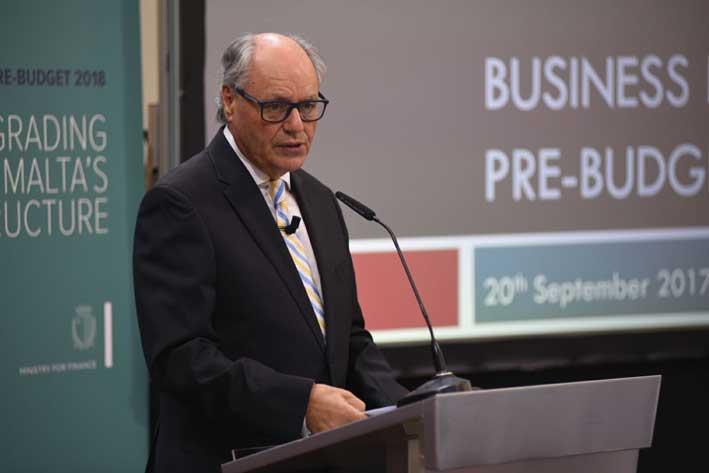
"Would this rental market need regulation? When it comes to contracts, the stories we hear are outrageous, and we are looking at that. Regulation does not necessarily mean control."
Scicluna was addressing a pre-budget breakfast where he gave an overview of Malta's current economic and fiscal situation, outlined priorities for the budget and also address current pending issues facing the nation. The budget will be presented to Parliament on 9 October
"There are ways where you can affect the rental through regulation by contracts being properly honoured by the landlord and the tenant. I have a lot of things to say, but is it a national problem? 86 per cent of the property is owner occupied, some of it is on a mortgage.
"I would be more alarmed if interest rates were to spike, they would affect more families than the rental markets in terms of numbers.
Budget policies must point towards "increasing supply"
"In Malta, we associate rent with social housing, which was controlled by the government subsidies. Of course it hits a number of people and it is painful. What I have told my people is look at the budget, every policy must work in one direction, increasing supply. We are trying not to fan demand."
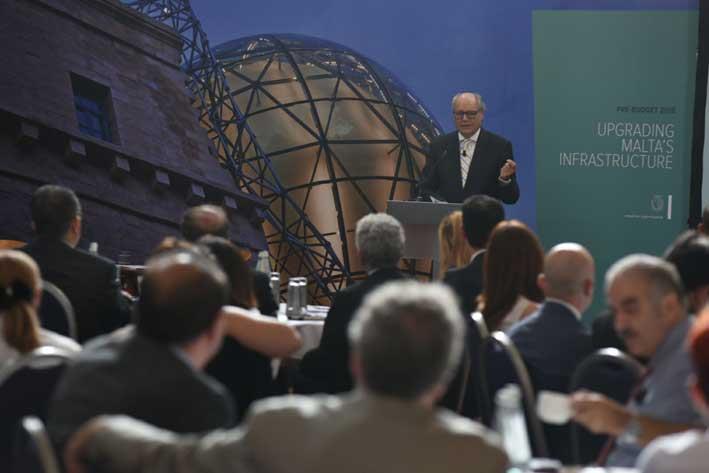
A representative of the Malta Developers Association, during question time, proposed that the controversial citizenship-by-investment threshold for renting should be increased from €1,400 to €2,500.
This is because agents are telling prospective clients looking to buy citizenship not to purchase property, but instead rent out lower end properties, which is leaving lower supply of lower-end properties for people actually residing in the country.
Budget proposals
Scicluna outlined the main issues facing Malta currently, mainly waste disposal, congestion, and a lack of space.
Waste management has recently made headlines due to the Mghatab landfill reaching full capacity. A choice therefore has to be made on whether to employ a short-term strategy by creating another landfill or some other long-term strategy.
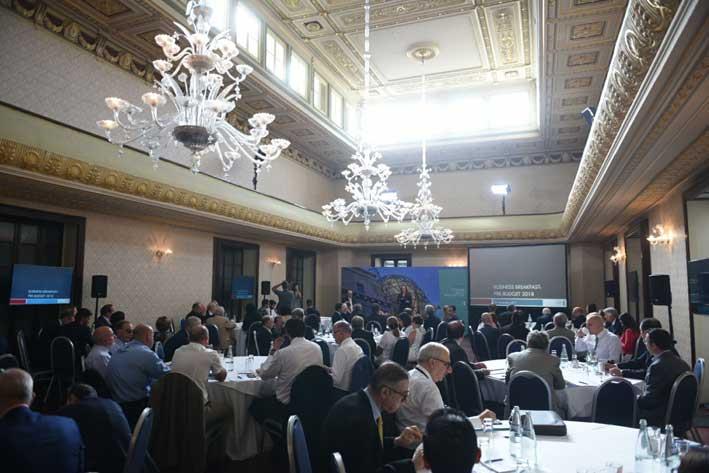
"Waste is an issue. We have not literally put it under the carpet, but it is there facing us. We have a big political choice, the NGOs have a choice to make as well.
"We have scarce resources on the island, where I am talking of Outside Development Land. We have to decide whether we want to sacrifice more pristine areas, especially close to Mghatab, or else find and complement them with other solutions".
He did not outline what these possible solutions could be.
Proposals to combat tax evasion
Scicluna revealed that tax evasion is high on the government's agenda, adding that a joint enforcement has been set up in order to "have a serious look at the Inland Revenue Department in terms of software and operations".
Government will be setting up a new appointment of Permanent Secretary tasked with restructuring the revenue department and helping it deliver better results.
"We want a firm, tough but fair revenue department," he said.
In yesterday’s Pre Budget business breakfast event, Minsiter Scicluna reported about the developments happening within the European circles, namely within ECOFIN, whereby France and nine other countries, are pushing their agenda to introduce a quick fix measure whereby businesses operating in the digital economy, will be charged a corporate tax based on turnover rather than on profits generated from that activity.
Minister Scicluna stated what he said in his intervention on the same subject matter during the ECOFIN meeting of EU Miinisters hald late last week in Tallinn, Estonia. Minister Scicluna’s intervention was that ”given the global aspect of digitalisation of our economies and the work that is already being carried out within the OECD on this matter, we are of the view, that any action emanating from the EU should be directed at reinforcing the said work that is being carried out by the OECD. So called “quick fix” solutions taken on a unilateral EU basis should be avoided, particularly where this could end up damaging EU companies. In view of this, EU solutions in this area should apply on a broader scale, and if solutions are found, then these should serve as input into OECD global discussions.
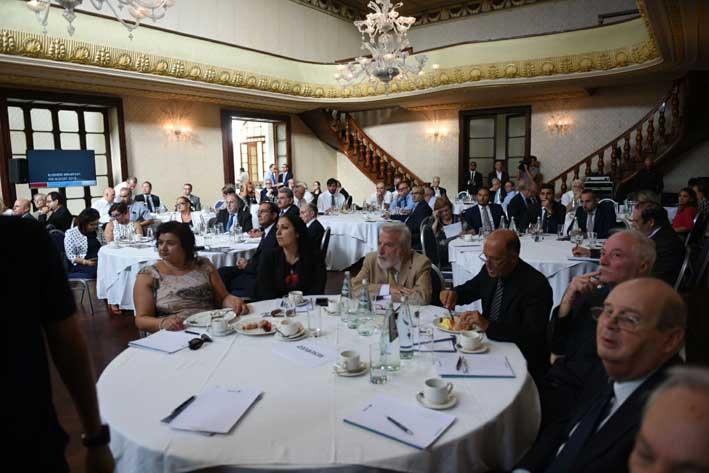
During question time, attention was raised to the large number of eateries under-declaring their income, for corporate tax and for VAT purposes. A study is currently underway into this.
Despite the budget theme being the improvement of Malta's infrastructure, brief words were spoken about concrete steps to improve the infrastructure. Scicluna outlined how Malta falls well below the EU average in terms of infrastructure.
That being said, government has already embarked on projects to improve infrastructure such as a huge scheme to improve Malta's road infrastructure.
Economic overview
Scicluna proudly outlined the low the 52 per cent debt to GDP ratio, far lower than the EU average, is a sign of the government surplus being put to good use, as it provides "fiscal breathing room". He spoke of how Greece, Spain and Cyprus' high debt means that the government must continue to restructure, leading to clashes with all sorts of unions.
Onto poverty, Scicluna said that it is just not right to say that poverty is on the increase, however that is not to say that poverty is being ignored.
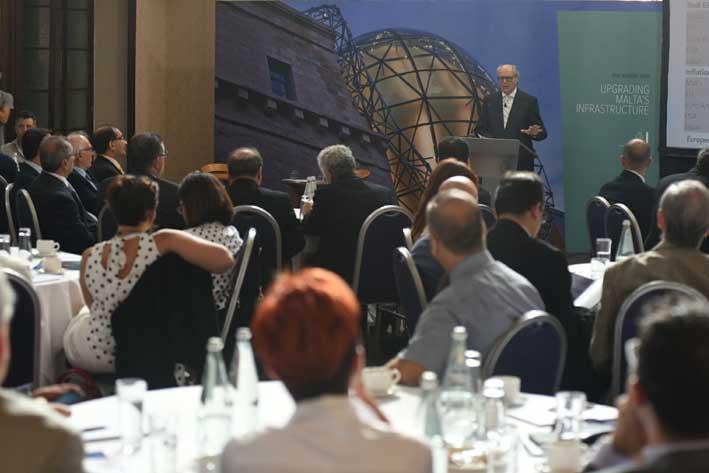
"There is a difference between the existence of poverty and poverty on the rise. It is not, all data we have points otherwise.
"The EU asked households whether they are able to make ends meet. Last year, the EU asked households whether they are able to make ends meet, and whether the previous year was the same as the current one.
"We are finding that less and less households are feeling unable to make ends meet...there are less families who are unable to make ends meet, but of course these families are still in existence and we need to tackle this".